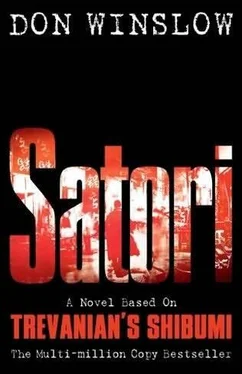Yu started across the pavilion for the pile of crates but Nicholai held him back. It was brave but useless to join the three soldiers in their isolated post. We would just become additional targets, Nicholai thought, a few more sacrificed stones in a soon-to-be eliminated position on the board. Better to create a new position and give the bandits something new to think about.
So Nicholai squatted behind a stone bench set at the edge of the pavilion. He waited until he saw a muzzle flash come from the bamboo and fired at it, then heard a man scream in pain. Yu did the same with the same result.
The shooting from the bamboo stopped as the bandits considered how to handle the new situation.
Nicholai used the pause to belly-crawl across that side of the pavilion to a bench on the perpendicular side. It would be better, he thought, if the bandits formed a tactic to deal with a situation that had already changed.
Go is a fluid game.
It was quiet for a moment longer and then a spray of bullets hit the stone bench that Nicholai had vacated. Yu pressed himself flat on the stones and survived the blast, but the bullets kept him down as a group of a dozen or more bandits sprang out of the bamboo and rushed the crates.
Nicholai, on the flank of the attack, easily picked the lead bandit off with his first shot but missed the second one and had to fire again. He dropped the next man, but the bandits in the bamboo adjusted quickly and turned their guns on him. Nicholai flattened out and the bullets passed over him.
Then he pushed himself up on his hands and the balls of his feet, took a deep breath, and vaulted over the bench.
Lit only by muzzle flashes, the scene before him played like cinema in a bad old theater with a creaky projector. Nicholai saw flickers of the melee at the crates – a bayonet thrust, a pistol fired at close range, a wounded man’s mouth agape. He plunged in, firing his rifle until the clip was empty. Then he used it like an ancient Chinese weapon – a sharp blade on one end, a blunt object on the other. He swung and thrust, ducked and dodged, beyond thought in the realm of instinct that came from constant training.
But the bandits were simply too many. The most skillful Go player will lose his few isolated white stones against a tide of black ones.
It was inevitable.
Die with honor.
Hai, Kishikawa-sama.
The cherry blossoms of Kajikawa floated in front of his eyes as he recalled his walk, so long ago, with the general. Kishikawa had focused on the beautiful blossoms to prepare himself for his death.
Then through the flashes of light Nicholai saw a row of brown-robed monks, bamboo staffs in their hands, advance onto the pavilion.
The fight became a whirling blur of bamboo, a tai-fung, but the rain pellets were wood striking flesh and bone, and then it was over, like a sudden squall. The surviving bandits fled back into the forest.
Without the precious cargo.
But six soldiers and one monk lay dead, and others were wounded.
Nicholai squatted beside the body of one of the bandits. Yu held up a lantern and they examined the dead man’s face. It took a moment, but then Nicholai recognized him… the orderly who had served lunch for Colonel Ki.
You have been careless and stupid, Nicholai told himself. “Michel Guibert” did not see the obvious ploy. Whereas Nicholai Hel would have. He resolved to retain a piece of his authentic self regardless of any situational guise.
The monks mopped up blood under lantern light.
Nicholai found the abbot, bowed deeply, and apologized for fouling the monastery with violence.
“You did not,” the abbot responded. “They did.”
“Still, I was the cause of it.”
“And so I will ask that you leave at first light and never return.”
Nicholai bowed again. “May I risk a possibly impertinent question?” When the abbot nodded, Nicholai asked, “I thought that you were pacifists. Why -”
“Buddhists are pacifists,” the abbot answered. “We are Daoists. We eschew violence except when necessary. But it is the mission of our order to offer hospitality. So we were forced to choose between two competing values – our desire not to harm our fellow creatures and our vow of sanctuary to our guests. In this case, we chose the latter.”
“You fight well.”
“When one chooses to fight,” the abbot replied, “it is one’s responsibility to fight well.”
Nicholai found Yu in his chamber, angrily stuffing his small gear into his haversack.
“They were your own men,” Nicholai said.
“I know that.”
His face already showed a loss of innocence. Nicholai felt some sympathy, but it did not prevent him from pressing the necessary question. “How am I supposed to trust you now?”
Yu led him out of the monastery to a wide spot on the trail, where a soldier was bound around the chest to the trunk of a tree.
It was Liang. Blood ran down his nose and a purple welt swelled under his eye. He had been beaten.
“He was one of the sentries,” Yu said disgustedly. “The one who survived. He claims he fell asleep, but I suspect that he deliberately let the bandits pass. Either way he is guilty. The monks would not let me execute him at the monastery so I brought him here.”
“You should not execute him at all.”
“At the very least, he failed in his duty.”
“So did we,” Nicholai said. “We should have been better prepared.”
“He caused the deaths of comrades,” Yu insisted.
“Again, as did we,” Nicholai argued. “Men aren’t perfect.”
“The new man must be,” Yu responded. “Perfect, at least, in his duty.”
Nicholai looked at Liang, who trembled with cold and fear. While we debate philosophy, Nicholai thought. It’s cruel. He tried again. “Perhaps he was performing his duty to Ki.”
“His duty is to the people.”
“He is the people, Yu.”
In response, Yu pulled his pistol from its holster and held the barrel to Liang’s head. His hand trembled as the boy cried and begged for his life.
Yu pulled the trigger.
“And that is how you know,” he said, “that you can trust me.”
DIAMOND FOUND HER in Vientiane, in the square outside the Patousay.
The monument, even with its Laotian spires, reminded him a little of an arc de triomphe. Indeed, Solange thought so too.
“It reminds me a little of home,” she said. “In Montpellier we have something similar.”
“What are you doing in Laos?” Diamond asked.
“Looking for work, monsieur,” she answered. “What are you doing in Laos?”
“Looking for you.”
“Ah, well. Your task, at least, is finished.”
“Yours too, maybe,” Diamond said. He was instantly jealous of Nicholai Hel. The thought that the arrogant bastard had slept with this gorgeous creature was infuriating.
“How so?” she asked.
“We might have something for you,” he said.
“ ‘We’?” she inquired, her tone slightly sarcastic and tantalizing at the same time. “You mean ‘we Americans’?”
“Yes.”
“I usually deal with Monsieur Haverford,” she said.
She pronounced it “Averfor,” which Diamond found stimulating beyond belief. “He’s on another assignment. He sent me. I’m Mr. Gold.”
Her smile was sensuous, ironic, and infuriating. “Really?”
“No.”
They walked out of the park onto Lane Xang.
“What do you have in mind, Monsieur Gold?” she asked.
Diamond told her, then added, “I think you’ll like it. It could be very lucrative, and Saigon is a lot like France, isn’t it?”
“In some aspects, yes.”
“So your answer?”
“Pourquoi pas?”
Читать дальше












